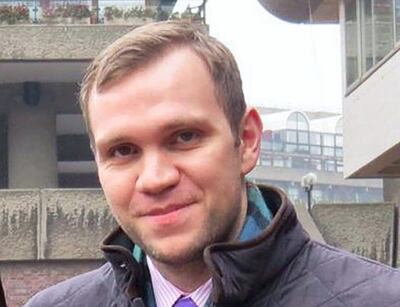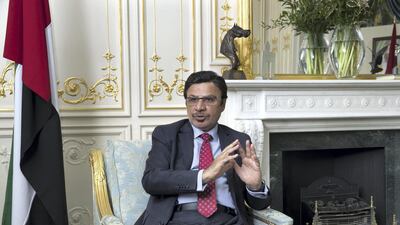The UAE Government is studying a request submitted by the family of British citizen Matthew Hedges for clemency, the UAE ambassador to the UK has said.
On Friday, Ambassador Sulaiman Almazroui gave a statement saying the family of the 31-year-old student has filed for leniency after he was sentenced to life in prison for spying - but he reiterated that the Hedges case was serious.
"[The court] reached their conclusion after a full and proper process," Mr Almazroui said.
"This was an extremely serious case. We live in a dangerous neighbourhood and national security must be a top priority."
He described Hedges' case as "unusual", saying "many researchers visit the UAE freely every year without breaking our laws and, under UAE law, everyone has the right to appeal after their conviction and everyone can request a pardon from our President [Sheikh Khalifa].
"Mr Hedges' family have made a request for clemency and the government is studying that request."
Mr Almazroui said he met with British Foreign Secretary Jeremy Hunt privately on Thursday after Sheikh Abdullah bin Zayed, the UAE's Minister of Foreign Affairs and International Co-operation, had spoken to Mr Hunt.
"As Mr Hunt said we have an extremely close partnership with the UK. Because of the strength of that partnership, we hope that an amicable solution can be reached," Mr Almazroui said.
On Thursday, Abdullah Al Naqbi, Head of the Department of Legal Affairs at the Ministry of Foreign Affairs and International Co-operation, said that the evidence presented in court against Hedges was "powerful and compelling".
He said that, contrary to media reports, Hedges was treated fairly and in accordance with the UAE’s constitution, having been offered the services of a court-appointed lawyer, which he accepted, and a translator throughout the trial that is conducted in Arabic.
"The UAE respects the rule of law and is committed to upholding the highest judicial standards. Like all countries with an independent judiciary it is vital that the government does not attempt to interfere in court cases,” Mr Al Naqbi said. “We cannot give assurances to other countries about the outcome of trials.”
Hedges, a student at Durham University in the UK, was convicted by the Federal Court of Appeal on Wednesday for attempting to procure sensitive information during a trip to the UAE this year.
Mr Al Naqbi said four court hearings were held from October 3 until the sentencing on November 21. He denied that Hedges was asked to sign documents he did not understand or refused access to his family or British Embassy staff.
"Our [judicial] system also takes care to protect the welfare and physical wellbeing of suspects. Mr Hedge’s has had access to medical and psychological care throughout," he said in a statement carried by state news agency, Wam.

"The case against Mr Hedges was thoroughly investigated by the public prosecutor. Compelling and powerful evidence was presented in court. That included information extracted from his personal electronic devices by expert forensic analysis techniques; evidence provided by UAE intelligence Agencies; witness testaments and Mr Hedges' own confession.”
The case has become a political issue in the UK, with Prime Minister Theresa May and Mr Jeremy Hunt making Hedges' situation a matter for diplomatic relations.
"The UAE is determined to protect its important strategic relationship with a key ally," Mr Al Naqbi said. "Officials from both countries have discussed the matter regularly over recent months. Both sides hope to find an amicable solution to the Matthew Hedges case."
On Thursday, Mr Hunt said he "believes and trusts" that Sheikh Abdullah bin Zayed, the Minister of Foreign Affairs and International Co-operation is "working hard to resolve the situation as quickly as possible".
The UAE's Federal Court of Appeal on Wednesday convicted Hedges of spying on the UAE and sentenced him to life in prison to be followed by deportation.
The UAE Attorney General, Dr Hamad Al Shamsi, had said the sentence should not be viewed as a “final” judgment, however, and that the PhD student was entitled to appeal within a month.
Hedges was arrested in May at Dubai International Airport after an Emirati man reported him to police for asking for sensitive information.
Prosecutors said he had been trying to secure confidential information to pass on to a foreign state — although they did not disclose which country.
_______________
Read more:
UAE Government: powerful and compelling evidence of Matthew Hedges' guilt
British spying trial: Attorney General says Matthew Hedges' verdict not 'final'
Matthew Hedges sentenced to life in jail by Abu Dhabi court
_______________
Hedges appeared in court to hear his sentence accompanied by his wife, Daniele Tejada, and officials from the British Embassy.
The court ruled that his devices — thought to be his computers and phone — as well as his research, would be confiscated and that he had the right to appeal within 30 days.
Ms Tejada has previously denied the charges against her husband in an interview with The Sunday Times.
“Matt is not guilty of what he is being charged with,” she said.
Ms Tejada said Hedges, whose family used to live in Dubai, was “fascinated by Emirati security and threw himself into his research”, which focused on relationships between different tribes in the UAE.

